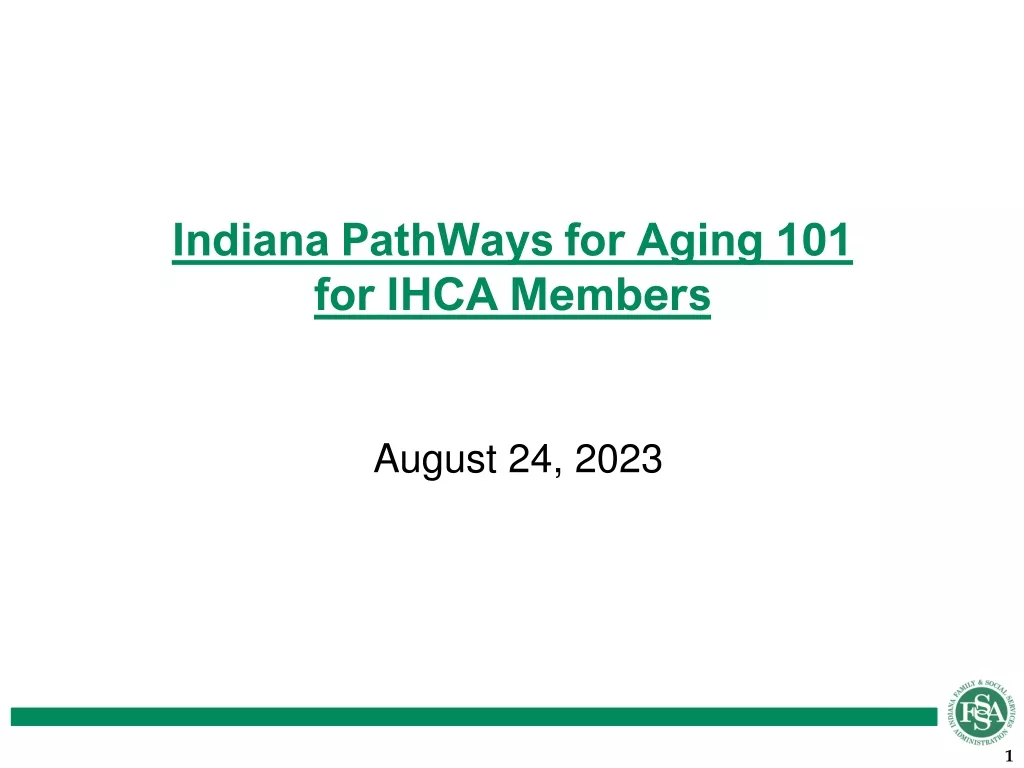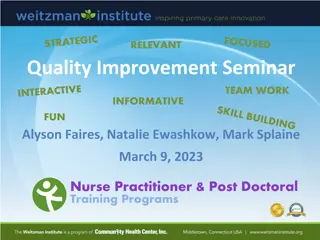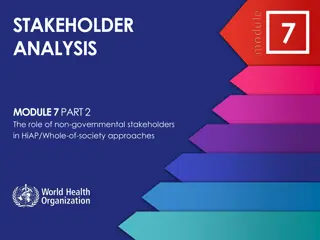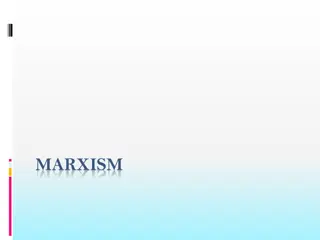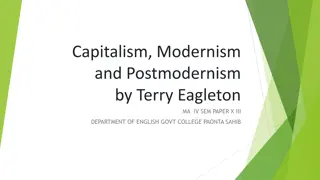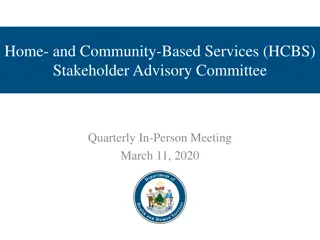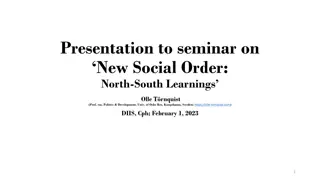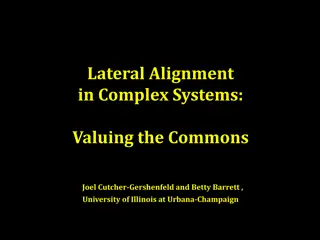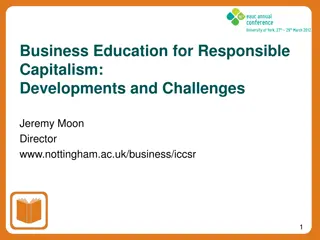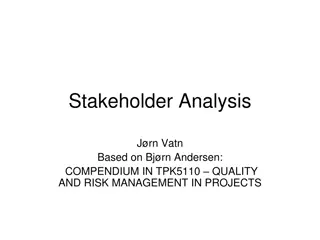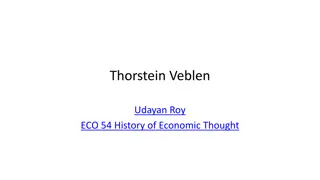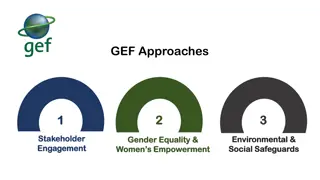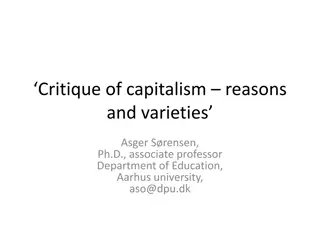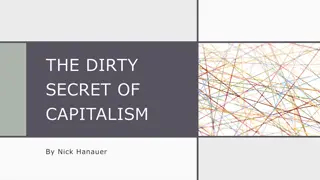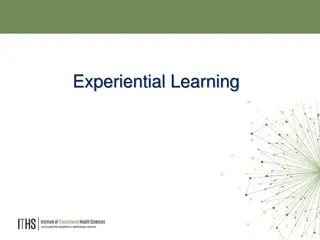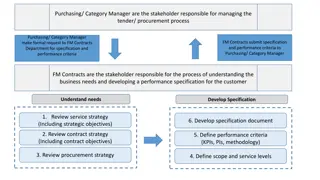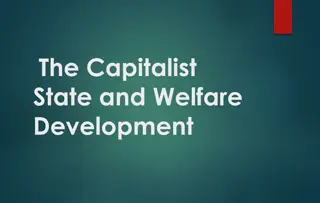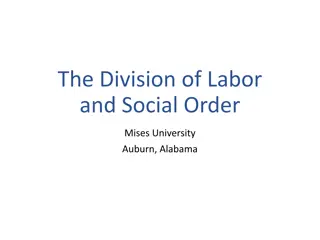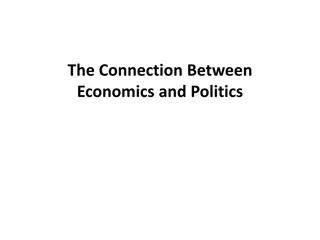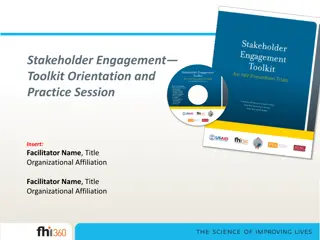Indiana PathWays for Aging 101 for IHCA Members
Indiana Pathways for Aging is a stakeholder-driven initiative aiming to reform long-term services and supports in Indiana. Key topics covered include program goals, enrollment processes, future stakeholder engagement, and the transition to person-centered care. The Pathways Codesign Workgroup plays
0 views • 31 slides
Debate Framework for Capitalism vs. Communism
This debate framework presents a structured approach for arguing in favor of or against the motion that capitalism is superior to communism. It includes sections such as introduction, statement of the motion, definitions, and criteria or principles to guide the debate. Emphasis is placed on developi
0 views • 9 slides
Quality Improvement Strategies for Stakeholder Engagement
Dive into the world of quality improvement with a focus on stakeholder engagement at the upcoming seminar led by Alyson Faires, Natalie Ewashkow, and Mark Splaine. Learn about effective conflict management, stakeholder considerations, and more through interactive sessions and insightful discussions.
2 views • 28 slides
Understanding Stakeholder Analysis in Health in All Policies (HiAP) Approaches
Stakeholder analysis in HiAP involves systematically gathering information to categorize stakeholders' importance, anticipate their influence, and develop strategies for involving them in policy implementation. Learn the purpose, process, and benefits of conducting a stakeholder analysis in this mod
2 views • 7 slides
Insights Into 'An Inspector Calls' Characters
In "An Inspector Calls," the Inspector represents socialism, with an air of solidity and omniscience. He delivers a warning about mankind needing to change and accept responsibility. Mr. Birling, on the other hand, embodies capitalism, shown as unlikeable and out of touch. The play critiques Birling
0 views • 7 slides
Understanding Marxism and Capitalism
Marxism is a body of social, political, and economic thought derived from the works of Karl Marx and Friedrich Engels, focusing on the analysis of capitalism. Capitalism is an economic system where private individuals own goods and services based on market supply and demand. The purest form of capit
0 views • 25 slides
Understanding Socialism: A Comprehensive Overview
Socialism is a political and economic ideology that advocates for collective or state ownership of production, distribution, and exchange. It emerged in the early 19th century as a response to industrial capitalism, aiming for a more egalitarian society that prioritizes collective well-being. Social
0 views • 9 slides
Understanding Capitalism, Modernism, and Postmodernism in Literature
Terry Eagleton's essay delves into the impact of capitalism on art and literature, exploring the emergence of modern and postmodern literature in the capitalist and late capitalist eras. He discusses how late capitalism influences art with characteristics like mass consumerism and virtual reality. P
1 views • 7 slides
HCBS Stakeholder Advisory Committee Quarterly Meeting Overview
The Home- and Community-Based Services (HCBS) Stakeholder Advisory Committee held a quarterly in-person meeting on March 11, 2020. The agenda included discussions on the Statewide Transition Plan, Individual Experience Assessment, workplan requests, and stakeholder engagement. Pre-meeting activities
0 views • 27 slides
Comprehensive Overview of Project Governance Model with Stakeholder Engagement
Explore the intricacies of a robust project governance model involving key elements such as risk management, system management, stakeholder engagement, and more. Learn about the roles of different committees, the importance of effective communication, and the strategies for managing project teams ef
0 views • 10 slides
Social Democratic Politics: Pillars and Strategies for Transformation
Social democratic politics is rooted in democratic collectivities and rights, aiming to reshape capitalism through reform, regulation, and transformative strategies. Olle Törnquist delves into the historical foundations and the need for comprehensive reforms to challenge the dominant logics of capi
3 views • 10 slides
Stakeholder Alignment and Commons Valuation in Complex Systems
Explore the challenges and strategies involved in stakeholder alignment and valuing the commons in complex systems through insights from various sources. Key themes include lateral stakeholder alignment, shared visions, leadership approaches, and building trust for effective partnerships.
1 views • 11 slides
The Role of Corporate Law in Wealth Distribution and Capitalism
Exploring the evolution of corporations within capitalist frameworks, this analysis delves into the intertwined concepts of managerialism, infinite wealth accumulation, and the social-historical embeddedness of corporations. Through historical contexts and theoretical perspectives, the discussion de
0 views • 17 slides
Regulator of Social Housing Stakeholder Survey Results 2022-2023: Key Findings and Insights
The Regulator of Social Housing conducted a stakeholder survey in 2022-2023, gathering insights from registered providers and other stakeholders. Key findings indicate positive perceptions of the regulatory framework, delivery practices, and future plans. Stakeholders appreciate the usefulness of RS
1 views • 19 slides
Evolving Trends in Business Education for Responsible Capitalism
Explore the developments and challenges in business education for responsible capitalism, focusing on the role of business schools, a decade of progress in programs and research, and analysis of UN PRME signatory reports. Discover how sustainability-related research and learning offerings are shapin
0 views • 25 slides
Exploring the Moral Foundations of Capitalism
Delve into the historical origins and ethical principles underpinning capitalism as seen through iconic quotes, foundational texts, and philosophical analysis. Understand the intertwined concepts of liberty, economics, philosophy, and ethics that shape capitalist ideology and practices, emphasizing
0 views • 42 slides
Stakeholder Analysis in Project Management: Understanding and Influence
Stakeholder analysis is crucial in project management as it helps in understanding the interests and expectations of individuals and organizations involved in a project. By evaluating stakeholder expectations throughout the project lifecycle, decisions can be made to ensure stakeholder acceptance an
1 views • 24 slides
Stakeholder Engagement in New Jersey Ocean Acidification Mitigation and Adaptation Planning
This content discusses stakeholder engagement in New Jersey's efforts to mitigate and adapt to ocean acidification, focusing on the economic, social, and environmental impacts on coastal communities. The process, methods, goals, and key takeaways of stakeholder engagement are outlined, emphasizing t
0 views • 12 slides
Shadow Education and Educational Capitalism in Cambodia
Exploring the impact of shadow education on the nation-state in Cambodia, this analysis delves into the complex interplay between educational development, compulsory schooling, privatization practices, and the emergence of educational capitalism. It questions the traditional notions of nation-state
0 views • 8 slides
Queer Art Beyond Identity Politics: Exploring Capitalism, Gentrification, and LGBT+ Inequalities
Explore the complex intersections of capitalism, gentrification, and LGBT+ identities through the lens of queer art and community activism. Unpack the nuances of human capital theory, dominance of middle-class white gay men, and challenges faced by people of color within the LGBT+ community. Contemp
0 views • 13 slides
Thorstein Veblen: Critic of Capitalism and Founder of American Institutionalism
Thorstein Veblen, a key figure in the history of economic thought, criticized capitalism for its rough and monopolistic nature. He founded the American Institutionalism School and challenged neoclassical economics' view of rational consumer behavior and business motivations. Veblen's analysis focuse
0 views • 23 slides
GEF Approach to Stakeholder Engagement
GEF's evolving approach to stakeholder engagement emphasizes full disclosure, consultation, and participation of major groups and local communities throughout project cycles. Policies and guidelines focus on promoting inclusive and meaningful stakeholder participation in support of the global enviro
0 views • 27 slides
Transition to Post-Capitalism: Unconditional Citizen Income in Mexico
Unstoppable technology advancements in capitalism lead to the replacement of human labor, creating an insufficient wage-labor income link. The concept of an Objective Limit of Capitalism (OLC) suggests that the need to exploit human labor will diminish as science progresses, highlighting the necessi
0 views • 7 slides
Critique of Capitalism: Reasons and Varieties by Asger Sørensen, Ph.D.
Asger Sørensen, Ph.D., delves into the critique of capitalism, exploring various perspectives such as political contestation, economic analysis, and value assessment. Through historical contexts and theoretical frameworks, Sørensen raises fundamental questions about capitalism's impact on freedom,
0 views • 10 slides
Unveiling the Dirty Secrets of Capitalism by Nick Hanauer
Nick Hanauer, a successful capitalist, sheds light on the flaws of capitalism and neoliberal economic theory, emphasizing the need for regulatory changes to benefit the majority. He challenges the assumptions of market capitalism and advocates for a new economic approach focused on cooperation and s
1 views • 25 slides
Rethinking Firm Governance Through Property Rights and Stakeholder Theory
Challenging the traditional shareholder-centric view, this study explores how property rights theory and stakeholder theory can offer a more comprehensive perspective on firm governance. It delves into the complexities of value creation, contractual relationships, and diverse stakeholder interests,
0 views • 10 slides
Enhancing Stakeholder Engagement for SPP/APR Implementation
The stakeholder meeting discussed new requirements for involving stakeholders in the State Performance Plan/Annual Performance Report (SPP/APR) package starting in February 2022. These requirements aim to widen stakeholder participation, seek diverse advice, and document the engagement process. The
0 views • 17 slides
Stakeholder Engagement in SPP/APR Meeting Results and Indicators
Stakeholder Meeting #2 discussed indicators 1, 2, 14, and 17 on July 27, 2021. The meeting highlighted new requirements for stakeholder involvement in the State Performance Plan/Annual Performance Report (SPP/APR) starting February 1, 2022. It emphasized expanding and documenting stakeholder engagem
0 views • 23 slides
Exploring Surveillance Capitalism and Academic Skills
Delve into the world of surveillance capitalism, academic skills, and the importance of maintaining an academic tone in speaking and writing. Explore self-assessment tools, including assessments on online privacy and security. Learn from experts like Mark Weinstein about social media, privacy advoca
0 views • 20 slides
Experiential Learning and Stakeholder Engagement Program
This program focuses on experiential learning opportunities, including stakeholder assessment and engagement strategies for successful implementation of research findings. Trainees will learn to identify stakeholders, understand their impact, prioritize engagement, and develop strategies. The progra
0 views • 11 slides
A Brief History of Communism: From Capitalism to Karl Marx's Vision
The history of communism traces back to the capitalist system's exploitation of workers in the mid-1800s. Karl Marx's vision, outlined in "The Manifesto of the Communist Party," aimed for economic equality and worldwide revolution. The inherent flaws of capitalism were critiqued, leading to the rise
0 views • 17 slides
Stakeholder Management and Contract Administration in Procurement Processes
Stakeholder management is crucial in procurement processes to ensure alignment with business needs and objectives. Purchasing/Category Managers and FM Contracts play key roles in understanding requirements, developing specifications, and managing contracts post-tender. By following a structured appr
0 views • 12 slides
The Political Economy of Regime Change in Central-Eastern Europe
The content discusses the concepts of socialism and capitalism, exploring various models and transitions from socialism to capitalism. It focuses on regime changes in Central and Eastern Europe, with case studies on Poland and Hungary. The text covers different varieties of socialism and their econo
0 views • 21 slides
Evolution of Capitalism and Welfare Development
Earnest Mandel identified three types of capitalism - industrial, entrepreneurial, and corporate - each influencing welfare development differently. Industrial capitalism lacked state welfare, while entrepreneurial capitalism introduced social security measures. Corporate capitalism necessitated sta
0 views • 10 slides
The Division of Labor and Social Order in Capitalism
In capitalism, conflict is viewed as an essential component of social relations, leading to increased productivity and unity among individuals. The division of labor promotes specialization and efficiency in production, ultimately benefiting society as a whole. Comparative advantages and opportunity
0 views • 16 slides
The Interplay of Economics and Politics: A Comprehensive Analysis
Explore the intricate relationship between economics and politics, delving into the evolution of capitalism, the necessity of private property rights, challenges in establishing capitalism in certain countries, and the complex dynamics between capitalism and democracy. The discussion highlights the
0 views • 9 slides
Exploring the Complex Relationship Between Football and Capitalism
The relationship between football and capitalism is analyzed through contrasting viewpoints, with one side viewing football as a tool for distracting the populace and compensating for societal injustices, while the other sees it as a form of art and human expression. The discussion delves into the s
0 views • 26 slides
Comprehensive Stakeholder Engagement Toolkit Orientation and Practice Session
Engage in a detailed session covering the key features of a Stakeholder Engagement Toolkit, including planning for socio-cultural factors, assessing stakeholder knowledge, and facilitating group discussions. Learn how the Toolkit provides guidance for efficient stakeholder engagement, documentation
0 views • 33 slides
Understanding China's Bureaucratic Capitalism and State-Directed Economy
China's approach to capitalism under Deng's reform embodies state-directed capitalism, characterized by central control over economic reforms while maintaining a non-democratic political system. This model has led to the rise of a bureaucratic capitalist regime with state-backed companies dominating
0 views • 11 slides
Effective Stakeholder Analysis Presentation Slides for PowerPoint
Discover professionally designed stakeholder analysis slides for your PowerPoint presentation. These slides cover stakeholder influence, power, needs, and commitment levels. Easily customizable to meet your specific requirements and enhance your stakeholder engagement strategies.
1 views • 8 slides
